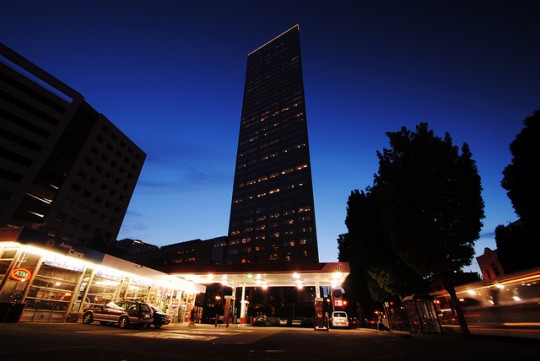
(Photo: C.M. Keiner)
Oregon’s 2015 legislative session is sure to include lots of plot twists for transportation policy. But at least among the key lobbyists, a grand bargain has been struck.
A group of advocates for biking, driving, urban density, public health, the gasoline industry, truck freight, rail fright, cities and public transit agencies — Oregon’s broadest-based organization of transportation interest groups — voted unanimously Thursday on the basic terms of a proposed transportation bill.
The deal brokered by members of the Oregon Transportation Forum would use a gas tax and/or auto fee hike to raise hundreds of millions of dollars over two years for infrastructure around the state.
Another $220 million or so would come out of the state’s general fund to support mass transit and off-road projects.
“SHARE COSTS FAIRLY: The State of Oregon should raise revenue from system users, as appropriate, based on the benefits they derive or the costs they impose on the system.”
— Oregon Transportation Forum consensus statement backing a possible gas tax hike
The group’s members also agreed to support making Oregon the first state in the country to let gas taxes automatically increase based not on inflation but on average motor fuel efficiency.
This would mean that as cars use less and less gasoline on average, the gas tax rate per gallon would rise even without further legislative action.
Last week’s agreement came two days after Oregon voters widened Democratic margins in both the state House and Senate, bringing the party close to the supermajorities required to raise taxes under state law — though not enough to pass a gas tax hike with zero Republican votes.
It also came as gas prices have fallen near a four-year low.
The current state tax is 30 cents per gallon; the federal gas tax is 18.4 cents. By law, state fees and taxes on driving can only be spent on road infrastructure, which includes bike lanes and sidewalks as well as big-ticket items like building freeways or repaving streets.
Metro lobbyist Randy Tucker shared the terms and working text of the agreement in an interview Thursday, and Bicycle Transportation Alliance Advocacy Director Gerik Kransky forwarded the working text of the terms. (Tucker and Kransky said the terms had been edited only slightly before Thursday’s vote, adding details to a youth transit provision. Update 1:45 pm: Here’s the text of the agreement as approved, including the revised YouthPass language.)
Terms of the proposal

(Photos: J.Maus/BikePortland)
Here’s the basic outline of the deal:
An unspecified combination of gas tax hikes and/or auto fees that would raise about as much over two years as the $300 million, six-cent gas tax hike Oregon approved in 2009. This increase would go toward both maintenance and new construction at the state, county and city levels, with maintenance as the “first priority.”
An additional one-cent-per-gallon gas tax hike that would be dedicated exclusively to allowing jurisdictional transfers of state-owned roads. This would raise an estimated $26 million annually that could be invested in bringing state roads up to local standards, allowing the state to offload control of so-called “orphan highways” (along with future maintenance costs) to cities and counties that want them. (We reported Friday that 82nd Avenue could be a key target for this provision.)
Indexing the state gas tax to average vehicle fuel efficiency, but not to inflation. (Kransky said every member of the coalition except one had supported indexing to inflation as well as efficiency, and that some would be lobbying for inflation indexing on their own time.)
$75 million over two years to support transit for seniors and people with disabilities, such as TriMet’s federally mandated door-to-door LIFT program. Because the state constitution forbids fees or taxes on driving to be spent on public transit, this would have to come out of the state’s general fund.
Advertisement
$23 million to preserve Amtrak Cascades service between Eugene and Portland, which would otherwise be eliminated amid declining federal subsidies. This is another general fund request.
$20 million over two years for youth-oriented transit programs around the state. This would restore state funding for YouthPass, the free universal transit passes that have been offered to Portland Public Schools high schoolers and a few other districts around the state in lieu of a yellow-bus program. It would also expand funding for other school districts who choose to use such programs. Again, this money would come out of the state’s general fund.
$100 million for the next round of Connect Oregon projects, which are set aside for non-road-related projects of statewide economic significance. Like last year, biking and walking projects would be eligible to compete for these grants along with public transit, rail, marine and airport projects. Connect Oregon has traditionally been paid for by bonding against future state lottery revenues.
Tucker said the group, on which he sits as a representative for the Metro regional government, had deliberately avoided specifying dollar figures for the amount to be raised by the gas tax or registration fee. Like all the figures above, those sums will be subject to negotiation with and among legislators.
Tucker also noted that the four general fund requests will be very hard to secure in full, because they will have to compete for money with schools and social services.
The agreement doesn’t explicitly associate any sort of project list with the new road revenue. Any state-level gas tax increase would also increase revenue to Portland and other local governments, who receive distributions of state gas taxes based on their number of registered automobiles.
State gas tax hike would increase local road funding
During Portland’s continuing discussion about a proposed per-household transportation tax or fee, Mayor Charlie Hales and other officials have opposed a local gas tax but called repeatedly for gas tax hikes at the state and federal level, saying the city can’t pay for all its transportation needs without such hikes.
Oregon created the country’s first gas tax in 1919, but has never tied it to inflation. As of September, eight states and the District of Columbia index gas taxes either to general inflation, to gas prices or to road costs. Massachusetts lawmakers agreed to begin indexing this year, but last week voters there overruled that decision.
BTA Advocacy Director Gerik Kransky said Sunday that the BTA had worked hardest for Connect Oregon to continue including biking and walking projects.
“We obviously have been working behind the scenes for months to be sure that was included,” Kransky said.
The other key provisions that drew BTA support were the calls for public transit funding for seniors and teens. Those have been backed by an informal alliance of nonprofits that support low-car transportation, including the BTA.
Kransky said the BTA will also be angling for the state transportation department to categorize bike lanes and sidewalks along existing roads as “fixing” the system rather than as expanding it.
“We don’t think active transportation infrastructure is additive to our streets,” Kransky said. “We think it’s integral.”
Tucker called the Oregon Transportation Forum proposal “the starting point for discussion.”
“The legislature will accept this in the spirit in which it is offered, I think, and then they will do what they do,” he said.
Correction 8:30 am: A previous version of this post incorrectly described the size of the gas tax hike approved in 2009.



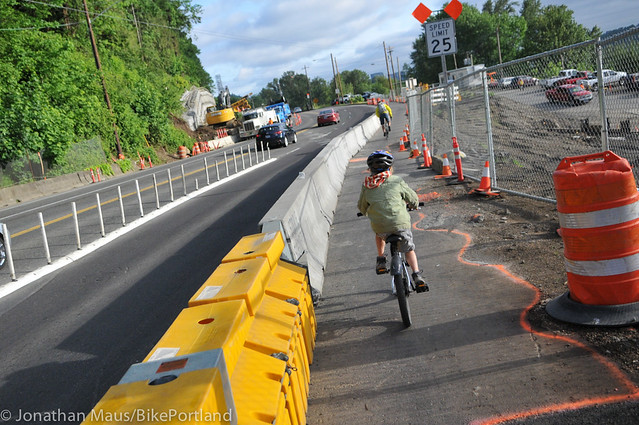
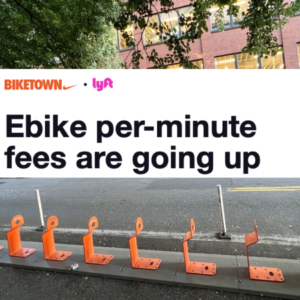
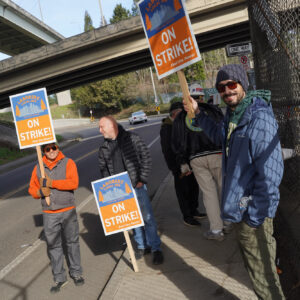

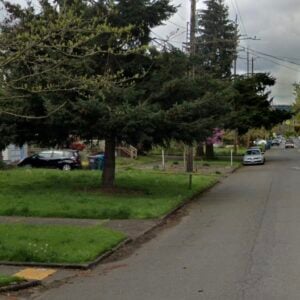
Thanks for reading.
BikePortland has served this community with independent community journalism since 2005. We rely on subscriptions from readers like you to survive. Your financial support is vital in keeping this valuable resource alive and well.
Please subscribe today to strengthen and expand our work.
The most recent increase in Oregon gas tax was 6 cents per gallon and went into effect in January 2011. It was not a nickel. Passage of legislation occurred in 2009.
Thanks! Fixed to six cents.
I definitely support this! And add inflation indexing too.
300 million – 75 million for the disabled – 23 million for trains between Portland and Eugene – 20 million youth passes – 100 million connect Oregon = 82 million over two years for maintaining existing roads. I thought Portland needed more than that just to fix the roads there. I guess this is what government math looks like. I would like to see gas taxes go up by $.25/per gallon for the next 4 years until it was an extra $1 per gallon but when the vast majority of the money is not helping the average worker get to and from jobs I think the government loses a lot of credibility in their ability to manage our tax dollars.
Re-read the article and re-do your math. The disabled assistance, train, youth pass, and Connect Oregon funds will not come from the gasoline tax.
True, but the post could have been clearer. I added a sentence.
All those programs are still spending so unless there is other additional government revenue, the money left is still only 82 million over two years. I’m guessing the “unspecified” combination of fees and taxes will allow money to be shifted around a bit between transportation and the general fund. If I’m saving money for a vacation I have to spend less on other discretionary items unless I take a second job for more income or borrow money.
The limitation on spending is unfortunate. This would be a far more progressive tax if some of the revenue could be allocated to mass transit.
This is excellent news. Nice to see different organizations actually working together for a change.
Glad to see progress. The real challenge is in dealing with the hard details. The proposal reads:
“FIX IT FIRST: The State of Oregon’s first priority should be to maintain, rehabilitate and operate existing transportation facilities before building new ones.”
Yet the amounts talked about don’t add up to ODOT’s annual backlog of maintenance shortfall. In 2011, ODOT said Oregon is $1.3 billion a year short in revenue to maintain steady-state; don’t know how close that is to current but presumably it’s back-of-the-envelope correct. http://www.blueoregon.com/2011/12/transportation-funding-hole/
So, if we’re honestly agreeing that “Fix it First” is a policy, it should bump out all new highway expansion (“modernization”).
In reality, that’s not what’s likely to happen, as elected officials love shiny new projects with press conferences, and pothole fixing and maintenance (the public’s priority) is hard to get credit for.
The word “priority” is one of the most abused and misused words in political discourse.
How many gallons of gas does Oregon go through a year? Unless my estimation skills are way off, raising 300 million over two years would involve a pretty minimal hike (pennies per gallon?).
According to http://www.eia.gov/state/seds/data.cfm?incfile=/state/seds/sep_sum/html/sum_btu_tra.html&sid=US
OR used 177 trillion BTU of gasoline in 2012. Since 1 gallon gasoline is 125,000 BTU, that is 1.4 billion gallons. Hypothetically, a 1c/gal tax would raise $14MM/year.
OR has about 4.1 million registered vehicles. http://www.oregon.gov/ODOT/DMV/docs/stats/vehicle/2013_Vehicle_County_Registration.pdf
Hypothetically, a $10/vehicle increase in annual registration fees would raise $40MM/year.
If I read the article correctly, the goal is to raise about $150MM/year ($300MM over two years) through gasoline tax and vehicle registration fee increases. That could be done by, just as an example, an 8c/gal increase in gasoline tax plus a $10/yr increase in per-vehicle registration fee.
Thanks John!
Thanks!
…just a couple of questions…would efficiency-based increases in the tax be based only on the average fuel efficiency of cars? Would fuel efficiency ratings also figure into tax hikes on fuel for commercial trucks and motorcycles? Don’t you have to have a mileage tax also to account for the increased use of electric vehicles?
Do you think the gas tax puts a burden on people who can’t afford to replace gas guzzlers with more efficient vehicles?
Finally, while I support the advocacy of the BTA I disagree with Mr. Kransky’s statement “We don’t think active transportation infrastructure is additive to our streets.”
It sounds like a defense of not taxing bicycles for the infrastructure improvements they do require.
I raise the point because as fewer cars use urban streets those car owners will be asked to pay more for maintaining those streets for all vehicles, including bicycles.
Finally, do you think these suggested tax changes will have to go on a statewide ballot?
“would efficiency-based increases in the tax be based only on the average fuel efficiency of cars? Would fuel efficiency ratings also figure into tax hikes on fuel for commercial trucks and motorcycles? Don’t you have to have a mileage tax also to account for the increased use of electric vehicles?”
Good questions. On electric cars, I’d personally think it would be easier to simply add a surcharge to their annual registration fee.
“Do you think the gas tax puts a burden on people who can’t afford to replace gas guzzlers with more efficient vehicles?”
Yes, but who is that? A 10-15 year old compact car is about as cheap as a usable vehicle gets nowadays, and they get 20-25 mpg easily enough. So if you can afford to buy a car at all, you can afford a reasonably fuel efficient car. The gas guzzlers I see driving around are big SUVs, full size pickup trucks, large luxury cars. Those are usually being driven by choice, not by necessity. I’m talking private vehicles, not trucks/vans being used by businesses.
“It sounds like a defense of not taxing bicycles for the infrastructure improvements they do require.”
This point has been discussed a lot. In Portland, most of the budget for road maintenance and projects does not come from gasoline taxes or vehicle fees. For example, PBOT’s budget is only 17% from gas taxes and 13% from parking fees. Most of PBOT’s budget is from other sources that draw from all taxpayers, which includes bicyclists.
https://www.portlandoregon.gov/transportation/article/421323
Then consider that the sums spent for bicycling infrastructure are very small, compared to the sums spent on vehicle infrastructure. I don’t know what current numbers are, but as of 2009 Portland had spent less than $60MM total on all the bike infrastructure that had been built over the preceding decade.
http://www.politifact.com/oregon/statements/2011/mar/19/sam-adams/portland-mayor-sam-adams-says-portlands-spent-its-/
“as fewer cars use urban streets those car owners will be asked to pay more for maintaining those streets for all vehicles, including bicycles.”
The cost of maintaining city streets depends on how many cars, trucks, and buses drive on them. So fewer cars may result in lower maintenance costs. In any event, cars cause ALL of the wear and tear on the streets. The wear and tear on a street caused by bicycles is effectively zero. As a result, bike infrastructure requires very little maintenance. Occasionally a bike lane stripe has to be repainted, and that is because cars, not bicycles, have worn off the striping.
“Finally, do you think these suggested tax changes will have to go on a statewide ballot?”
Don’t know.
I’ve cited this example here before, but my friend recently traded his Subaru Forester for a GMC Sierra “Texas Edition” because of the $34K he gets back under tax loopholes for his small business. (His business is purely intellectual and he doesn’t actually need a truck for it BTW).
I would think at this stage a good portion of any surcharge on electric vehicles might go to covering the current subsidies provided for purchasing them.
Oddly enough, by the way, the big GMC with it’s V8 gets pretty close to the same highway mileage as his old XT did (he drives between Oregon and Texas twice a year).
We’re doomed.
Traffic isn’t the only thing that causes wear and tear on the streets, exposure to the elements does it’s fair share as well. Particularly Ice.
“cars cause ALL of the wear and tear on the streets”
I think the elements have an impact, also.
“Do you think the gas tax puts a burden on people who can’t afford to replace gas guzzlers with more efficient vehicles?”
Now that gas prices have come down the American public is instead showing they can certainly afford to replace efficient vehicles with gas guzzlers:
http://wallstcheatsheet.com/automobiles/8-winners-and-losers-of-electric-vehicle-sales-in-october.html/
Typo:
“and that some would be lobbing for inflation indexing on their own time”
Too bad this deal does not include support for an amendment to the state constitution that would allow local jurisdictions to use their share of gas tax and/or vehicle registration for a broad range of transportation projects, not just roads. Without that, this proposal is not very climate friendly.
I appreciate the efforts by the BTA to reframe the conversation surrounding bike lanes and sidewalks by categorizing these as *fixes* to existing infrastructure rather than additions. It seems criminal to see bulldozers and crews tearing up and repaving a street, only to focus exclusively on auto-centric modes of transportation.
The intersection at 122nd and Sandy is a perfect example. Not too long back the road leading to/from 122nd was widened, the drainage improved, but the sidewalk did not follow, nor did they take the opportunity to connect the bike lane between the existing one on 122nd and the other one on Sandy.
https://www.google.com/maps/@45.5569803,-122.5365507,3a,75y,132.78h,74.95t/data=!3m4!1e1!3m2!1spIh1vzDElq2tAyrzPjGITg!2e0
Hales and Novick should jump on the bandwagon for the Gas Tax increase. The latest street fund scheme allows me a “free” ride, thanks (I guess?)
The BTA needs to mention the role that biking plays in reducing C02 and how it’s cheaper to add bike infrastructure than build seawalls to keep the ocean back.
Where’s the studded tire conversation? the number one preventable action to preserve our investment in roads and it’s FREE!
remove studs!
4,400 pound Tesla vehicles make road ruts, too.
not on concrete, studs rut concrete
Truckers and commercial fleet operators don’t pay gas tax. They only pay the weight/mile tax. Have they also proposed an increase in the weight/mile tax to capture all the commercial trucks, fleets, and haulers operating both locally and in the state?
Wow! Is this April Fool’s Day? We got all of these groups – including the gasoline industry (?!) – to agree to a gas tax hike? Let’s do this! About freakin’ time.
Dont worry about the electric cars, for now.
1. They’re still rare compared to the gas cars.
2. Electric cars are preferable in terms of emissions.
It makes sense to not tax them in the short run in order to encourage their use. We’ll get better local air quality. When they have become a major threat to revenue, then tax.
The Leaf is the most common all electric car. It sold 24k so far this year. There were over a Million car+ truck sales in October.
The manufacture of new cars, SUVs, and trucks takes tremendous resources and energy. It doesn’t matter whether the vehicles are gas or diesel powered, or electric, hybrid, or natural gas. Just the layers of paint applied to new vehicles is immensely energy intensive.
Any time we move a large amount of weight faster than a few miles per hour, it takes a lot of energy, including moving electric vehicles. The local emissions are better with electric, but in the end the generation of electrons to manufacture and charge batteries emits large amounts of carbon molecules into the atmosphere, equivalent of particles of mass destruction.
The truth is that we, as a “modern” version of homo sapiens, over the past century of cheap oil, have become incredibly addicted to large everything, high speed and volume.
Anything we can do do to discourage further purchasing and driving of vehicles would be a good first step of sane policy toward a serious effort at achieving a sustainable tomorrow. Thus, I have always favored an inflation-indexed fuel tax, or a per mile road user fee based calculated from an installed device. These fees are an easily collected cost to fund maintenance of transportation infrastructure. The fuel tax is, of course, incorporated into the cost per gallon at the pump.
An intense encouragement and development of infrastructure to facilitate human-powered transportation, including walking, seems to me to be common sense, but that would require a yeoman’s task of confronting our addiction, something that takes a tremendous commitment. All who have struggled to recover from destructive addictions to substances and other distracting habits know the commitment and support needed for such effort.
The brutal truth is that our lifestyles of insatiable consumption, all carbon-based, are on a collision course with life itself threatening our extinction, or near so. It is literally insane. Dramatic reduction in our carbon-based lifestyles is essential for survival, but this also requires us to make a commitment to re-connect with community reliance as an alternative to our obsessive individualism. Go bikes and trikes!
So if I buy an electric car, in a small way I cause the gas tax to go up because I’m increase the average economy? I love it!
I think this article could be more clearly written. A quick read of this and I am confused.
Wait – I thought just a few months ago everyone agreed that a hike in the gas tax (or even the one we have) was a ‘dinosaur’, a ‘third rail,’ ‘dead in the water’, ‘political suicide’?
Glad to see I misheard.
“This would mean that as cars use less and less gasoline on average, the gas tax rate per gallon would rise even without further legislative action.”
Who comes up with this nonsense? Do they even understand what it is they are proposing?
Is this on-road fleet average fuel economy they’re hoping to index this to? Because that has hardly changed at all over the past couple of decades. It is still in the low twenties and heading nowhere fast. This penchant for inventing needlessly complex formulas reminds me of the BTA’s disastrous attempt last year to clarify how roads are funded. The underlying concept (index gas tax, show that everyone pays for roads already) is valid and important, but when it comes to actually making the case, someone cooks up some crazy, misguided algorithm or graphic that sinks the whole thing. Why?!
Cars today are using somewhat less gasoline on average not because of fuel economy improvements (a miniscule effect spread over the whole fleet) but because people in the US are, on average, driving substantially fewer miles than they were six-ten years ago. If we’re going to link the gas tax to anything, it should be the asphalt index: that is what will, mostly, be purchased with the funds raised, and the cost of it has risen considerably faster than the CPI.
On road fuel economy of all (so-called) light duty vehicles in the US was about 14mpg in 1923 and is somewhere around 22mpg today, 90 years later.
The index should be to the cost of labor. The price of asphalt, concrete and steel are also important, but the biggest part of the cost of transportation projects is the labor for engineering and construction. And this usually goes up faster than the price of commodities.
Good call. Why don’t we play it safe then and index it to the sum of asphalt and labor costs?
Paving oil costs have increased 300% over past decade, while the CPI has gone up 25%.
http://www.oregon.gov/ODOT/HWY/ESTIMATING/docs/asphalt_fuel_prices/macmp_graph.pdf
http://www.usinflationcalculator.com/inflation/consumer-price-index-and-annual-percent-changes-from-1913-to-2008/
You guys are hilarious. We’ve all been complaining for years that the gas tax should be raised, and as soon as people are seriously talking about it, suddenly the gas tax isn’t good enough.
You’re funny. Where I come from if someone in a position of power, someone whose wages my taxes pay, proposes something stupid—even if, or perhaps especially if, that stupid thing is nested within a necessary thing—I’m going to point that out. Democracy is built on criticism. That is the only chance we have at decent solutions to our many problems.
Besides you can bet the folks who don’t like gas taxes are going to latch onto some stupid provision and it might as well come from a supporter first, don’t you think?